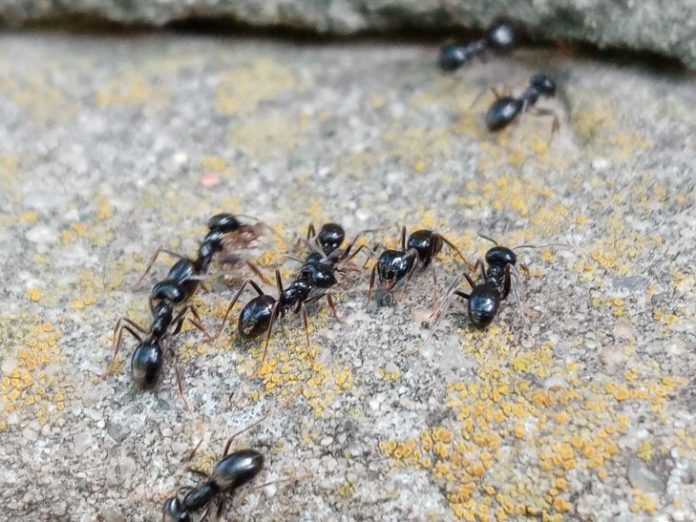Ants, these tiny inhabitants of our gardens, seem fearless and tireless.However, even these little workers have their fears and weaknesses..
Gardeners for centuries have tried to unravel the secrets of ant behavior in order to protect their beds from their invasions..
Today the veil of secrecy will be lifted about what these insects are really afraid of and how to use this knowledge for harmonious coexistence in the garden.
Natural enemies of ants
Ants, despite their large numbers and organization, have many natural enemies.Birds, spiders and other insect predators pose a serious threat to colonies.
Anteaters and echidnas are especially dangerous for ants, as they can destroy an entire nest in a matter of minutes.
Gardeners can attract birds to the garden by installing bird feeders and waterers to help naturally control the ant population.
Smells that repel ants
Surprisingly, these hard-working insects are very sensitive to certain odors.
Strong aromatic herbs and spices such as mint, garlic, cinnamon and cloves make ants uncomfortable.
Planting these plants around your garden beds or using their extracts as natural repellents can be effective in repelling unwanted guests.
Changes in the environment
Ants are extremely sensitive to changes in their environment.Sudden changes in temperature, humidity, or soil pH can cause an entire colony to leave its home.
Experienced gardeners take advantage of this feature by regularly digging up the soil and changing its structure, which makes the beds less attractive to ants.
Chemical means of protection
Modern science offers a wide range of chemical preparations for fighting ants. However, their use requires caution and knowledge. Many insects are afraid of boron and its compounds.
Boric acid, used in small quantities, can effectively repel ants without harming plants.
Disruption of pheromone trails
Ants communicate and navigate using pheromones, leaving chemical trails.
Disturbing these trails disorients the insects and can cause them to leave the territory.
Simply wiping surfaces with a vinegar solution or lemon juice effectively erases pheromone marks, disrupting communication between individuals.
Competition for resources
Surprisingly, ants fear competition. The presence of other insect species, especially those that feed on the same resources, can displace ants from their usual places.
Maintaining a balance between different insect species in the garden is the key to natural ant population control.
Physical barriers
Creating physical barriers is another effective method of protecting beds. Ants do not like to overcome sticky or slippery surfaces.
Strips of chalk, diatomaceous earth or special adhesive tapes around the beds can become an insurmountable barrier for these small garden pests.
Earlier we told you how experienced gardeners use currants.
Sudden changes in temperature, humidity, or soil pH can cause an entire colony to leave its home.
Experienced gardeners take advantage of this feature by regularly digging up the soil and changing its structure, which makes the beds less attractive to ants.
Chemical means of protection
Modern science offers a wide range of chemical preparations for fighting ants. However, their use requires caution and knowledge. Many insects are afraid of boron and its compounds.
Boric acid, used in small quantities, can effectively repel ants without harming plants.
Disruption of pheromone trails
Ants communicate and navigate using pheromones, leaving chemical trails.
Disturbing these trails disorients the insects and can cause them to leave the territory.
Simply wiping surfaces with a vinegar solution or lemon juice effectively erases pheromone marks, disrupting communication between individuals.
Competition for resources
Surprisingly, ants fear competition. The presence of other insect species, especially those that feed on the same resources, can displace ants from their usual places.
Maintaining a balance between different insect species in the garden is the key to natural ant population control.
Physical barriers
Creating physical barriers is another effective method of protecting beds. Ants do not like to overcome sticky or slippery surfaces.
Strips of chalk, diatomaceous earth or special adhesive tapes around the beds can become an insurmountable barrier for these small garden pests.
Earlier we told you how experienced gardeners use currants.
Sudden changes in temperature, humidity, or soil pH can cause an entire colony to leave its home.
Experienced gardeners take advantage of this feature by regularly digging up the soil and changing its structure, which makes the beds less attractive to ants.
Chemical means of protection
Modern science offers a wide range of chemical preparations for fighting ants. However, their use requires caution and knowledge. Many insects are afraid of boron and its compounds.
Boric acid, used in small quantities, can effectively repel ants without harming plants.
Disruption of pheromone trails
Ants communicate and navigate using pheromones, leaving chemical trails.
Disturbing these trails disorients the insects and can cause them to leave the territory.
Simply wiping surfaces with a vinegar solution or lemon juice effectively erases pheromone marks, disrupting communication between individuals.
Competition for resources
Surprisingly, ants fear competition. The presence of other insect species, especially those that feed on the same resources, can displace ants from their usual places.
Maintaining a balance between different insect species in the garden is the key to natural ant population control.
Physical barriers
Sudden changes in temperature, humidity, or soil pH can cause an entire colony to leave its home.
Experienced gardeners take advantage of this feature by regularly digging up the soil and changing its structure, which makes the beds less attractive to ants.
Chemical means of protection
Modern science offers a wide range of chemical preparations for fighting ants. However, their use requires caution and knowledge. Many insects are afraid of boron and its compounds.
Boric acid, used in small quantities, can effectively repel ants without harming plants.
Disruption of pheromone trails
Ants communicate and navigate using pheromones, leaving chemical traces.
Disturbing these traces disorients the insects and can cause them to leave the territory.
Simply wiping surfaces with a vinegar solution or lemon juice effectively erases pheromone marks, disrupting communication between individuals.
Competition for resources
Surprisingly, ants fear competition. The presence of other insect species, especially those that feed on the same resources, can displace ants from their nesting sites.
Maintaining a balance between the different species of insects in the garden is the key to natural ant population control.
Physical barriers
Creating physical barriers is another effective method of protecting garden beds. Ants do not like to cross sticky or slippery surfaces.
Strips of chalk, diatomaceous earth, or special sticky tape around garden beds can be an insurmountable barrier for these little garden pests.
Earlier we told how experienced gardeners use currants.
Competition for resources
Surprisingly, ants fear competition. The presence of other insect species, especially those that feed on the same resources, can displace ants from their nesting sites.
Maintaining a balance between the different species of insects in the garden is the key to natural ant population control.
Physical barriers
Creating physical barriers is another effective method of protecting garden beds. Ants do not like to cross sticky or slippery surfaces.
Strips of chalk, diatomaceous earth, or special sticky tape around garden beds can be an insurmountable barrier for these little garden pests.
Competition for resources
Surprisingly, ants fear competition. The presence of other insect species, especially those that feed on the same resources, can displace ants from their nesting sites.
Maintaining a balance between the different species of insects in the garden is the key to natural ant population control.
Physical barriers
Creating physical barriers is another effective method of protecting garden beds. Ants do not like to overcome sticky or slippery surfaces.
Strips of chalk, diatomaceous earth or special adhesive tapes around the beds can become an insurmountable barrier for these small garden pests.
Earlier we told you how experienced gardeners use currants.


